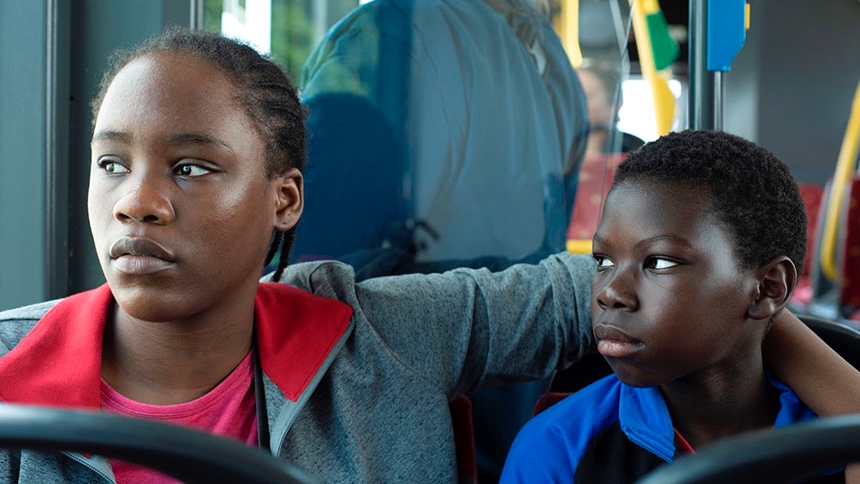TORI AND LOKITA Review: The Dardennes' Strongest Film in Years
Pablo Schils, Joely Mbundu, and Alban Ukaj star in a brutal and emotionally bare film, directed by Jean-Pierre Dardenne and Luc Dardenne.

The Dardenne Brothers, Jean-Pierre and Luc, have been making social realist dramas since the 90s. With Tori and Lokita, they tell a heartbreaking tale of two immigrant children bonding over their traumatic experience and trying to survive in a foreign country.
Their makeshift family is quite different from that of Kore-eda's films: if Kore-eda's characters bonded together because of economic necessities, Tori and Lokita's bonding is simpler and based on innate emotions first and foremost: the everyday violence and fear the immigrants face on all sides are quite real and immediate, and their need for each other's presence in the absence of adults is even greater.
It starts with a teenage girl, Lokita (Joely Mbundu), being questioned at a panel hearing that will determine whether they will grant her the necessary papers to stay in Belgium. But her story doesn't quite add up to prove that she is indeed Tori (Pablo Schils)'s older sister.
She is prone to panic attacks, and they have to stop the interview. Later we see that they are rehearsing their questions and answers together (Tori already has papers). While staying at a communal housing provided by authorities, the two are inseparable, sharing a bed together where Tori only falls asleep to Lokita's lullaby.
They sing together at a restaurant for money and Lokita delivers weed to clients. It's Betim, the restaurant's chef, who runs the drug business out of the kitchen in the basement, that she works for.
With the African smugglers, who brought them first to Europe from Benin, constantly demanding money with threats of violence, and Betim asking sexual favors all the time, it's quite difficult for Lokita to send money home, where mom and five siblings are dependent on her, and also subsist in an unforgiving foreign country as a child. But Lokita is insistent on Tori continuing his education and not getting involved with Betim's business.
The point the Dardennes are driving home with the film is pretty clear. It's the shared trauma that bonds Tori and Lokita together as they met on the boat that took them to Europe. Their bond is quite simple to understand – going through horrendous hardships together, thousands of miles from home. Their need for emotional support from each other is tremendous. Lokita's panic attacks, and their need to see and talk to each other every day, is well illustrated throughout the film.
Things get darker when Lokita agrees to work at a weed farm in a faraway undisclosed location, tending weed while locked in the facility for days at the promise of fake documents that will let her stay in the country. It’s modern slavery at work.
Tori's desire to be reunited with Lokita and his resourcefulness locates her. He sneaks in through the ventilation system of the compound, and they plan to rip the chef off of his game. But they get caught.
Tori and Lokita hits you hard. It's one of the most brutal and emotionally bare films the Dardennes have ever directed. Mbundu and Schils are terrific as the two young leads. The film addresses some uncomfortable truths about a horrible immigration system and the lack of support for refugees, especially children, to survive and deal with the trauma.
Tori and Lokita opens Friday, March 24, in New York City as part of The Dardennes' retrospective at IFC Center, March 17-25. A national roll-out will follow.
Dustin Chang is a freelance writer. His musings and opinions on everything cinema and beyond can be found at www.dustinchang.com
Tori and Lokita
Director(s)
- Jean-Pierre Dardenne
- Luc Dardenne
Writer(s)
- Jean-Pierre Dardenne
- Luc Dardenne
Cast
- Pablo Schils
- Joely Mbundu
- Alban Ukaj







